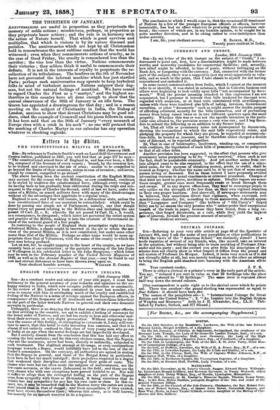/ Mfrs to t4t Eititur.
THE CONSTITUTIONAL MILITIA OF ENGLAND. 16th January 1858. Sitt—By reference to Toulmin Smith's 'work on Local Self-Government and Centrnization, published in 1851, you will find that at page 377 he says- " The constitutional armed force of England is, and has ever been, a Mili- tia, composed of the freemen of every county ; bound, by the common law, to be trained and exercised to the use of arms ; unable to be compelled to go beyond the limits of their counties, unless in case of invasion ; and never, except by consent, compelled to go abroad."
The above having been the ancient constitution of the English Militia may account for the reason why the Militia, as now constituted, continues to be styled by tradition the constitutional force, although every vestige of its having been so has gradually been obliterated during the reign and sub- sequent to the reign of Charles the Second, until at last we have under the name of a Militia, an armed military force with many of the disadvantages without all the advantages that appertain to a regular army.
England is now, and I fear will remain, in a defenceless state, unless the true tonstitutional force of our ancestors be refistablished : which could be done by passing one simple act of Parliament, namely, one that !Wald repeal every act passed relating to the Militia since and including the one
palmed 13 Carl. II, e. 6; whereby the act passed 14 Carl. U, c. 3 would, as a consequence, be abrogated ; which latter act perverted the entire system and practice of the Militia, making it into the creature of Government in- stead of the national guard of a free people.
In restoring to the people of England their prescriptive right to a Con-, stitutional Militia, a clause might be inserted in the act to retain the ser- vices of the present Militia, as it is now constituted, but under some other name than that of the Militia. Perhaps no other name would be more ap- propriate than that of Volunteers, with the name of the county to which the men may belong prefixed.
Let us not, Sir, be caught napping in the heart of the empire, as we have recently been at our extremities; or the patriotic warning of the late Duke of Wellington in his celebrated letter to Sir John Burgoyne,—which letter may be seen in the February number of the United Service Magazine of 1848, as well as in the Annual...Register of that year,—may be found to our cost and eternal dishonour to have been thrown away upon us.


































 Previous page
Previous page